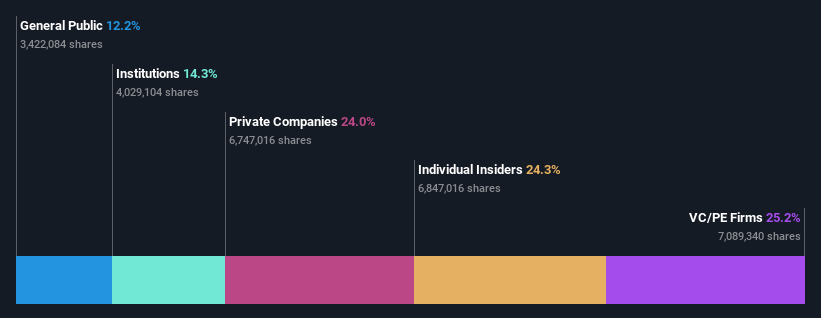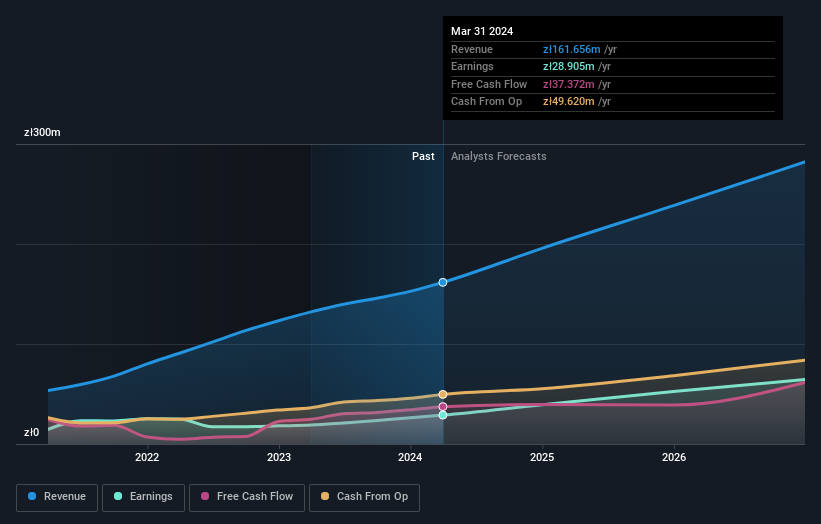Shoper S.A.'s (WSE:SHO) 10% gain last week benefited both private equity firms who own 25% as well as insiders

Key Insights
- The considerable ownership by private equity firms in Shoper indicates that they collectively have a greater say in management and business strategy
- A total of 4 investors have a majority stake in the company with 62% ownership
- Insider ownership in Shoper is 24%
Every investor in Shoper S.A. (WSE:SHO) should be aware of the most powerful shareholder groups. And the group that holds the biggest piece of the pie are private equity firms with 25% ownership. In other words, the group stands to gain the most (or lose the most) from their investment into the company.
While private equity firms were the group that reaped the most benefits after last week’s 10% price gain, insiders also received a 24% cut.
Let's take a closer look to see what the different types of shareholders can tell us about Shoper.
Check out our latest analysis for Shoper

What Does The Institutional Ownership Tell Us About Shoper?
Many institutions measure their performance against an index that approximates the local market. So they usually pay more attention to companies that are included in major indices.
As you can see, institutional investors have a fair amount of stake in Shoper. This implies the analysts working for those institutions have looked at the stock and they like it. But just like anyone else, they could be wrong. It is not uncommon to see a big share price drop if two large institutional investors try to sell out of a stock at the same time. So it is worth checking the past earnings trajectory of Shoper, (below). Of course, keep in mind that there are other factors to consider, too.

Hedge funds don't have many shares in Shoper. Value4Capital is currently the company's largest shareholder with 25% of shares outstanding. The second and third largest shareholders are Krzysztof Krawczyk and Rafal Krawczyk, with an equal amount of shares to their name at 12%. Rafal Krawczyk, who is the third-largest shareholder, also happens to hold the title of Member of Supervisory Board.
On looking further, we found that 62% of the shares are owned by the top 4 shareholders. In other words, these shareholders have a meaningful say in the decisions of the company.
Researching institutional ownership is a good way to gauge and filter a stock's expected performance. The same can be achieved by studying analyst sentiments. Quite a few analysts cover the stock, so you could look into forecast growth quite easily.
Insider Ownership Of Shoper
While the precise definition of an insider can be subjective, almost everyone considers board members to be insiders. Management ultimately answers to the board. However, it is not uncommon for managers to be executive board members, especially if they are a founder or the CEO.
Insider ownership is positive when it signals leadership are thinking like the true owners of the company. However, high insider ownership can also give immense power to a small group within the company. This can be negative in some circumstances.
Our information suggests that insiders maintain a significant holding in Shoper S.A.. Insiders own zł325m worth of shares in the zł1.3b company. We would say this shows alignment with shareholders, but it is worth noting that the company is still quite small; some insiders may have founded the business. You can click here to see if those insiders have been buying or selling.
General Public Ownership
With a 12% ownership, the general public, mostly comprising of individual investors, have some degree of sway over Shoper. While this group can't necessarily call the shots, it can certainly have a real influence on how the company is run.
Private Equity Ownership
With an ownership of 25%, private equity firms are in a position to play a role in shaping corporate strategy with a focus on value creation. Some investors might be encouraged by this, since private equity are sometimes able to encourage strategies that help the market see the value in the company. Alternatively, those holders might be exiting the investment after taking it public.
Private Company Ownership
Our data indicates that Private Companies hold 24%, of the company's shares. It's hard to draw any conclusions from this fact alone, so its worth looking into who owns those private companies. Sometimes insiders or other related parties have an interest in shares in a public company through a separate private company.
Next Steps:
It's always worth thinking about the different groups who own shares in a company. But to understand Shoper better, we need to consider many other factors.
I like to dive deeper into how a company has performed in the past. You can find historic revenue and earnings in this detailed graph.
But ultimately it is the future, not the past, that will determine how well the owners of this business will do. Therefore we think it advisable to take a look at this free report showing whether analysts are predicting a brighter future.
NB: Figures in this article are calculated using data from the last twelve months, which refer to the 12-month period ending on the last date of the month the financial statement is dated. This may not be consistent with full year annual report figures.
New: Manage All Your Stock Portfolios in One Place
We've created the ultimate portfolio companion for stock investors, and it's free.
• Connect an unlimited number of Portfolios and see your total in one currency
• Be alerted to new Warning Signs or Risks via email or mobile
• Track the Fair Value of your stocks
Have feedback on this article? Concerned about the content? Get in touch with us directly. Alternatively, email editorial-team (at) simplywallst.com.
This article by Simply Wall St is general in nature. We provide commentary based on historical data and analyst forecasts only using an unbiased methodology and our articles are not intended to be financial advice. It does not constitute a recommendation to buy or sell any stock, and does not take account of your objectives, or your financial situation. We aim to bring you long-term focused analysis driven by fundamental data. Note that our analysis may not factor in the latest price-sensitive company announcements or qualitative material. Simply Wall St has no position in any stocks mentioned.
About WSE:SHO
Shoper
Shoper SA provides Software as a Service solutions for e-commerce in Poland.
Outstanding track record with high growth potential.

